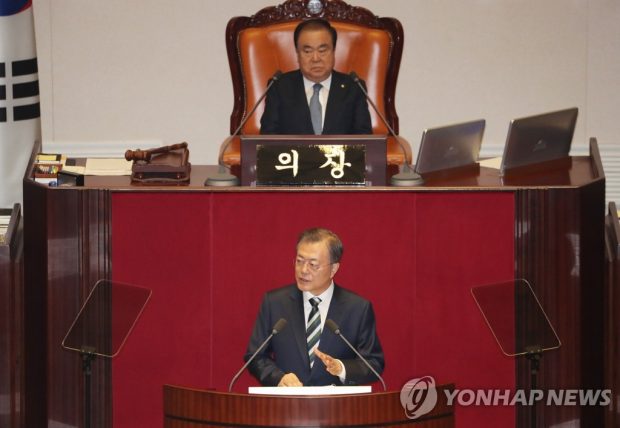
Moon vows strong education, prosecution reform to promote fairness

Seoul: President Moon Jae-in pledged a strong push Tuesday for the far-reaching systemic reform of South Korea’s public sectors, including education and the prosecution.
In his budget speech at the National Assembly, Moon stressed the importance of promoting fairness to achieve the key policy goals of innovative, inclusive and peace-based growth.
“‘Fairness’ should be established anew in not just the economy but also social, educational and cultural fields,” he said. “Once again, I realized the public aspiration for ‘fairness’ and ‘reform.'”
He was apparently referring to months of social rifts over his pick of Cho Kuk as justice minister. Cho, one of the closest aides to Moon, was given a mandate to spearhead the reform of the state prosecutors office accused of having too much power and authority.
Cho, however, has faced harsh public criticism over reported privileges and alleged irregularities involving his family. His daughter might have gained unfair advantage in her schooling, especially in admission to a post-grad medical school. Cho stepped down last week, but related controversies go on.
“The government has striven so far to eliminate privileges, irregularities and unfairness, prevalent in our society,” the president said. “But the people’s demands were much higher than that.”
He pointed out the people’s desire for a “fundamental change” even in the “legitimate impartiality” and perks inherent in the country’s system.
“As the president, I will have a sense of heavier responsibility,” Moon added.
He cited impartiality in education as “the most heartbreaking thing” for ordinary people here and vowed to overhaul the college entrance exam system to raise the proportion of “regular admissions,” which focus more on applicants’ academic grades than non-school activities.
Moon also asked lawmakers to pass pending prosecution reform bills at an early date.
At issue, in particular, is the ruling bloc’s push for the establishment of a special agency dedicated to investigating corruption among high-ranking officials.
Moon, a former lawyer, pointed out that there’s no effective alternative in case the prosecution is negligent in its audit and inspection of its internal corruption.
The envisioned institution is very meaningful as a special body to combat high-profile corruption even including a sitting president and his or her family members.
It will play a role in promoting integrity among high-ranking civil servants, Moon said.
He requested that the National Assembly “assume the most important role” for prosecution reform.
He used the word “fairness” 27 times in this half-hour address mainly intended to explain about government budgets for 2020 and fiscal policy.
On the budget plan, Moon emphasized the need for an “active role” of finance, saying it should serve as a “breakwater” to block the waves of external shock and also “priming water” to help revitalize the economy.
The liberal government is seeking a total of 513.5 trillion won ($438.5 billion) in next year’s budget spending, a 9.3 percent hike from 2019.
Amid the rapid exacerbation of the world economy attributable to the spread of the Washington-Beijing trade row and protectionism, Moon said, Asia’s fourth-biggest economy, heavily dependent on exports, is confronted with “severe situations.”
South Korea is struggling to counter such internal problems as low growth, polarization, unemployment, low birth rates and an aging society.
Moon also reaffirmed his unswerving commitment to the Korea peace process.
“The Korean Peninsula is now facing the last crucial moment to move toward permanent peace,” he said. “It’s a wall of denuclearization we’re going to have to cross over together. Only conversation can bring down the wall.”
He urged North Korea to respond positively to his peace drive aimed at bringing a bright future for the communist nation via the “virtuous cycle” of fostering inter-Korean economic cooperation and establishing lasting peace. He has characterized it as “peace economy.”
YONHAP


